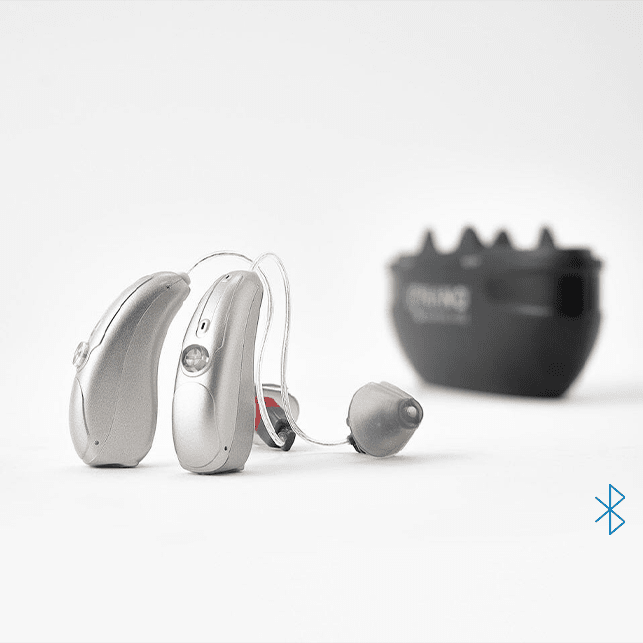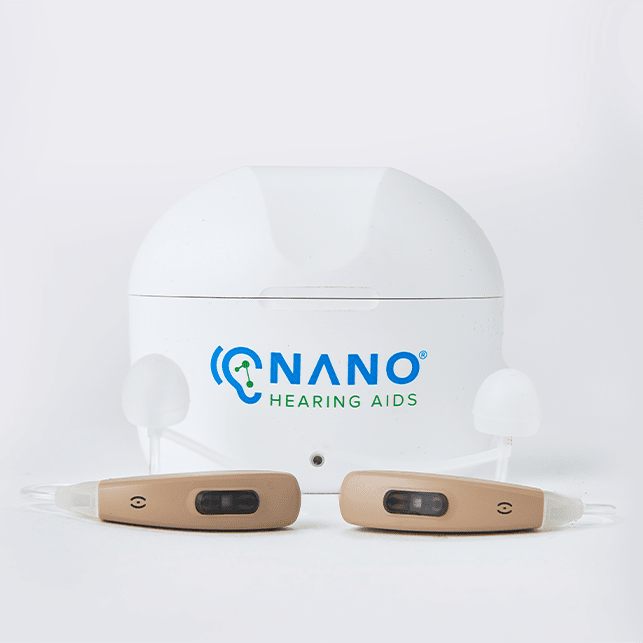Key Takeaways
Identifying Lip Smacking as a Dementia Symptom
Dementia occurs due to brain cell damage - and as the brain controls all our bodily functions, it cannot perform the regular tasks properly when the cells are damaged.
Involuntary movements - actions that occur without conscious control - can be subtle, like a twitch, or more pronounced, like lip smacking. These movements are typically caused by disruptions in the brain's ability to communicate with muscles.

C: Dementia affects the learning and memory center of the brain along with the cerebellum. The cerebellum is responsible for controlling the movement of the human body. As a result, dementia patients may experience involuntary muscle spasms, rigidity, and muscle tensing (image courtesy of Weil Institute of Neurosciences).
AT: Image of brain parts.
Lip smacking can be a primary symptom of dementia, alongside memory loss, confusion, and behavioral changes.
Nano Hearing Aids are FDA-registered, Class I devices. These OTC hearing aids are designed for individuals over 18 years of age with perceived mild to moderate hearing impairment. Nano won the Top ENT Solution Provider 2023, has 24/7 customer care, and has an affordable price compared to others.
Link Between Lip Smacking and Dementia Types
Connection with Lewy Body Dementia
Lewy Body Dementia (LBD) happens when abnormal proteins are deposited in the brain, which disrupt normal brain function. These deposits can affect movement and coordination, leading to symptoms like lip smacking. LBD usually presents with a combination of cognitive decline and motor symptoms.
Indicators in Alzheimer's Disease
As Alzheimer’s worsens, it physically changes the brain which disrupts normal motor and behavior functions - leading to involuntary movements like lip smacking. It can also affect communication abilities - since individuals can’t express their needs or discomfort verbally, lip smacking may emerge as a response to frustration or as a non-verbal signal of anxiety.
Other Neurological Disorders' Similarities
Besides dementia, there are other neurological disorders than can cause lip smacking:
Diagnosing the Underlying Cause
Signs and Symptoms to Watch
Besides lip smacking, other symptoms of dementia are memory loss, confusion, difficulty with communication, and changes in mood or behavior. Physical signs like difficulty walking, tremors, or changes in coordination can also be indicators of neurological issues.
Family members are often the first to notice these changes. Keep a detailed record of symptoms, including their frequency and duration so that they can be shared during medical consultations.
Medical Evaluation and Tests
Once symptoms like lip smacking are observed, consult a healthcare professional for a comprehensive evaluation. Some common procedures a dementia patient goes through are:
Detecting dementia early means that treatment plans can be administered early to slow the progression of symptoms, improve quality of life, and provide families with adequate support
Treatment and Management Options
Treatment Option | Description | Benefits |
| Medication | Prescribed to manage symptoms like memory loss and mood changes. | Can help stabilize cognitive functions and improve mood. |
| Therapy | Includes speech and occupational therapy to support daily activities. | Enhances communication skills and daily living abilities. |
| Lifestyle Changes | Involves diet, exercise, and mental stimulation | Promotes overall brain health and slows symptom progression. |
Treatment plans for dementia are adjusted based on the patient's specific symptoms and needs, but a combination of medication, therapy, and lifestyle adjustments is usually recommended to address both cognitive and physical symptoms.

C: Support groups and counseling can also provide emotional support and practical advice to help patients and their families manage the challenges of dementia.
AT: Support group.
Current Medical Treatments
There are some medications available that can help manage the symptoms of dementia. Cholinesterase inhibitors, such as Donepezil, are commonly prescribed to improve cognitive function by increasing the levels of a chemical messenger involved in memory and judgment.
Another class of drugs, NMDA receptor antagonists like Memantine, work by regulating the activity of glutamate, a chemical involved in information processing in the brain. These medications can help with memory, attention, reason, and language skills.
Antidepressants and antipsychotics may also be prescribed for mood and behavioral symptoms.
Lifestyle Changes to Consider
A balanced diet rich in omega-3 fatty acids, antioxidants, and vitamins can support brain health. Regular physical exercise helps maintain cardiovascular health, which is closely linked to cognitive function.

C: Engaging in mentally stimulating activities, such as puzzles or learning a new skill, can help keep the brain active and potentially delay the progression of dementia.
AT: A finger moving a jigsaw puzzle.
Maintaining social connections is also important, as social interaction can help reduce feelings of isolation and depression - common in dementia patients.
How Hearing Aids Can Reduce Impacts of Dementia
Hearing loss patients may develop dementia if the disability is not treated. As the ear cannot deliver enough sound signals to the brain, the brain starts using more cells to process sound and disrupts other functions.
Hearing loss can also impact people’s day-to-day activities and cause communication problems, which sometimes lead to long-term mental health conditions like depression and anxiety, along with dementia.
Hearing aids can significantly reduce the risks of dementia and involuntary movements like lip-smacking from occurring.
At Nano Hearing Aids, we have manufactured top-quality OTC hearing aids at an affordable price.
Conclusio
Understanding dementia symptoms like lip smacking can help families to know when to seek care and support. With early intervention and a comprehensive approach like exercising, eating healthily, and using hearing aids, it is easier to manage dementia and achieve a better quality of life for all involved.
Frequently Asked Questions:
What causes lip smacking in dementia patients?
Lip smacking in dementia patients is often caused by involuntary muscle movements due to brain cell damage. This affects the brain's ability to control motor functions, leading to repetitive actions like lip smacking.
Can lip smacking be an early sign of dementia?
Yes, lip smacking can be an early sign of dementia, particularly in types like Lewy Body Dementia and Alzheimer's. It often occurs alongside other symptoms such as memory loss and confusion, indicating changes in brain function.
How do hearing aids help with dementia symptoms?
Hearing aids can help by improving communication and cognitive function, which may reduce the risk of dementia-related symptoms.
At Nano Hearing Aids, we sell OTC hearing aids for individuals with perceived mild to moderate hearing loss. Our products include completely-in-canal (CIC) and behind-the-ear (BTE) styles, priced between $297 and $597 per pair.



